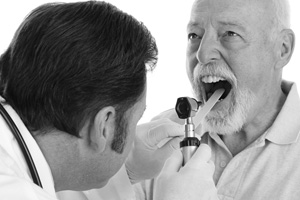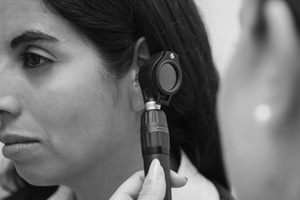View the complete list of conditions
What Are Nasal Polyps?
Nasal polyps treatment is usually straightforward and uncomplicated. But what are polyps, really? Nasal polyps are overgrowths on mucous membranes in the nose, often occurring simultaneously with allergic rhinitis (hay fever). Nasal polyps symptoms include congestion, loss of smell (anosmia), sinusitis and headaches.
Nasal polyps are generally grouped into two different types: ethmoidal polyps, which are the rarer of the two, and antrochoanal polyps. Ethmoidal polyps develop in the ethmoidal sinuses of the nose, while antrochoanal polyps arise in the maxillary sinuses, situated in the cheeks. For both ethmoidal and antrochoanal polyps, nose obstruction is a common symptom despite their respective locations. If you believe you may have nasal polyps, nose obstruction, loss of smell and excessive sneezing are all signs you should pay attention to.
Often, nasal polyps symptoms are difficult to identify for patients, and may be confused with general allergy symptoms. While it is thought that allergies often contribute to both nasal polyps and deviated septums, they do not necessarily have to exist together. Though the causes are suspected to involve chronic allergies, cystic fibrosis is also thought to be a possible cause of polyps.
While allergies and cystic fibrosis are often cited as the most likely causes of nasal polyps, there are many diseases that are associated with the condition. Asthma, Young’s Syndrome, Churg-Strauss Syndrome, Kartagener’s Syndrome, nasal mastocytosis, and chronic sinus infections are all associated with nasal polyps. At least two aspects of nasal polyps are generally necessary for a proper diagnosis. One major symptom, including reduced smelling capability, nasal blockage and facial pressure, must be present. One minor sign must be in existence as well, which include dental pain, cough, headache and fever.
Steroids and rinsing the sinuses are often used for nasal polyps treatment, and while surgery is a popular solution to nasal polyps, recurrence is not uncommon. However, surgeries for both nasal polyps and deviated septum surgery are quick procedures that can be done under local anesthesia using endoscopic surgery. Recovery from nasal polyp surgery should take between one and three weeks, which is why, if you’re a New York resident, nasal polyp surgery in Midtown is a convenient option.
In Midtown, nasal polyps treatment can be dealt with quickly, and without extensive days off. Local anesthesia means quick recovery times for this type of treatment, and as such, quick return to work and recreation for patients who undergo the procedure. For nasal polyp surgery in Midtown, nasal polyps patients are only a few subway stops away from great treatment and quick consultations with doctors.
Conditions
Ears
Nose
- Ballon Sinusplasty Surgery
- Concha
- Deviated Septum Relief In NYC
- Deviated Septums
- Fixing a Deviated Septum
- Identifying A Deviated Septum
- How Do I Know if My Nose is Broken?
- Nasal Polyps
- Nasal Polyp Surgery
- Nasal Septums
- NYC Nasal Polyp Reduction
- Septoplasty And Turbinate Surgery
- Treating a Deviated Septum
- Treating Nasal Polyps
- Turbinate Reduction
Throat
- Dysphagia
- Leukoplakia Treatments
- Reflux Laryngitis
- Swallowing Disorders
- Treating Anosmia
- Vocal Disorders
Allergies & Asthma
- Dealing With Allergic Rhinitis
- Managing Allergies and Asthma
- How to Allergy-Proof Your Home from Indoor Allergens
Sinus
- Chronic Sinusitis Treatment
- Endoscopic Sinus Surgeries
- Sinus Headache Cure
- Sinus Infection Treatment
- Sinusitis Surgery
- Treating Sinus Infections
Sleep & Snoring
- Diagnosing Sleep Disorders
- Having Trouble Sleeping
- Home Sleep Studies
- Pillar Implants
- Pillar Treatment for Snoring
- Sleep Apnea Conditions
- Sleep Apnea Specialists
- Sleepless in NYC
- Sleep Study Diagnosis
- Can Snoring Cause Health Issues?
- Treating Sleep Apnea
- Treating Snoring
- What is a CPAP Device?





